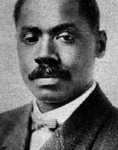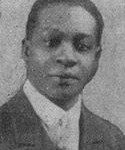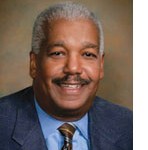She Survived a Slave Ship, the Civil War and the Depression. Her Name Was Redoshi.
Photo: Redoshi, who was known as Sally Smith after she became enslaved, with her husband, called Uncle Billy or Yawith. (Credit, via Shirley Quarles)
(New York Times) It has long been believed that a man named Cudjo Lewis was the last living survivor of the trans-Atlantic slave trade in the United States. Now a researcher at Newcastle University in Britain says she has discovered testimony from someone who may have lived even longer — a woman named Redoshi.
The new findings, published last week in the journal Slavery & Abolition, are likely to be subject to scholarly debate, because there are few records documenting the lives of the last Africans to be captured and brought to the United States on slave ships.
Regardless of Redoshi’s precise historical status, the researcher, Hannah Durkin, has pieced together accounts from different sources and census records to carve out the remarkable life of a woman who survived the treacherous Middle Passage voyage at age 12, was sold as a child bride, and lived through the Civil War and the Great Depression. According to Dr. Durkin, Redoshi died in 1937; Lewis died in 1935. (more)
Police Chief Apologizes for 1922 Lynching As Abilene Confronts Painful Chapter Of Its History

Abilene Police Chief Stan Standridge (second from left) apologizes to the family of Grover C. Everett. (Photo: Ernesto Guajardo)
(KeraNews) A lynching that took place 97 years ago in Abilene, Texas, was publicly recognized for the first time Saturday. A college student’s curiosity was the first spark that made it happen.
Bria Kimble, a senior sociology major at McMurry University, recently read the book Lynching in America for a class.
“I’m always interested in researching things so I went to Google, typed in ‘lynching in Abilene, Texas’ and I found Grover Everett,” she said. “From there it just kind of spiraled into more questions and trying to figure out what happened.”
That search for answers led Kimble on a journey that brought her to the site of his death, a grassy field where a hotel once stood in what used to be called Negrotown. Her research helped bring together community leaders to organize a public ceremony to tell Everett’s story. (more)
More details on the murder: Mr. Grover C. Everett, Remembered 97 Years After Lynching
Community wants answers after historic black HS is demolished
(KTBC Fox7Austin) Earlier this month, the Austin Independent School District demolished L.C. Anderson High School, a historic black high school in Austin.
The important cultural and educational building was brought to the ground, leaving the public who cherished the building confused and disappointed because the District had given them no warning, according to former Austin City Council member Ora Houston.
On Monday (April 22), Ms. Houston testified to the Board of Trustees, saying “It was the responsibility of the District to disclose to the community, changes to the preservation plan before the demolition commenced.” (more)
TIPHC Bookshelf
 Published scholarship on black history in Texas is growing and we’d like to share with you some suggested readings, both current and past, from some of the preeminent history scholars in Texas and beyond. We invite you to take a look at our bookshelf page – including a featured selection – and check back as the list grows. A different selection will be featured each week. We welcome suggestions and reviews. This week, we offer, “Afro-Mexico, Dancing Between Myth and Reality,” by Anita González.
Published scholarship on black history in Texas is growing and we’d like to share with you some suggested readings, both current and past, from some of the preeminent history scholars in Texas and beyond. We invite you to take a look at our bookshelf page – including a featured selection – and check back as the list grows. A different selection will be featured each week. We welcome suggestions and reviews. This week, we offer, “Afro-Mexico, Dancing Between Myth and Reality,” by Anita González.
While Africans and their descendants have lived in Mexico for centuries, many Afro-Mexicans do not consider themselves to be either black or African. For almost a century, Mexico has promoted an ideal of its citizens as having a combination of indigenous and European ancestry. This obscures the presence of African, Asian, and other populations that have contributed to the growth of the nation. However, performance studies—of dance, music, and theatrical events—reveal the influence of African people and their cultural productions on Mexican society.
In this work, Anita González articulates African ethnicity and artistry within the broader panorama of Mexican culture by featuring dance events that are performed either by Afro-Mexicans or by other ethnic Mexican groups about Afro-Mexicans. She illustrates how dance reflects upon social histories and relationships and documents how residents of some sectors of Mexico construct their histories through performance. Festival dances and, sometimes, professional staged dances point to a continuing negotiation among Native American, Spanish, African, and other ethnic identities within the evolving nation of Mexico. These performances embody the mobile histories of ethnic encounters because each dance includes a spectrum of characters based upon local situations and historical memories.
This Week in Texas Black History
Apr 29
 This date marks the birth of physician J. Edward Perry in 1870 in Clarksville, Texas. Born to former slaves, Perry graduated from Bishop College in Marshall in 1891 then from Meharry Medical College in Nashville, Tenn. in 1895. On November 1, 1910 he founded the Perry Sanitarium and Training School for Nurses (and doctors) to tend black patients in Kansas City. The sanitarium was renamed Wheatley-Provident Hospital in 1915 and Dr. Perry served as its superintendent from 1910 until 1930. At age 76, Perry came out of retirement to serve as executive director of the Houston Negro Hospital in March 1947. Through his dedicated efforts, the hospital became accredited and affiliated with Baylor College of Medicine.
This date marks the birth of physician J. Edward Perry in 1870 in Clarksville, Texas. Born to former slaves, Perry graduated from Bishop College in Marshall in 1891 then from Meharry Medical College in Nashville, Tenn. in 1895. On November 1, 1910 he founded the Perry Sanitarium and Training School for Nurses (and doctors) to tend black patients in Kansas City. The sanitarium was renamed Wheatley-Provident Hospital in 1915 and Dr. Perry served as its superintendent from 1910 until 1930. At age 76, Perry came out of retirement to serve as executive director of the Houston Negro Hospital in March 1947. Through his dedicated efforts, the hospital became accredited and affiliated with Baylor College of Medicine.
Apr 29
 In 1892, Carter W. Wesley, newspaperman and political activist, was born on this day in Houston. Wesley received a B.A. degree from Fisk University in Nashville in 1917, entered the Army and became one of the first black officers in the U.S. military. After serving in World War I, he earned a law degree from Northwestern University in Evanston, Illinois and in 1927 returned to Houston where he bought into a newly formed publishing company which owned the Houston Informer newspaper. In 1934, he became publisher and used the paper as a platform to battle racism and to speak on behalf African Americans. Wesley was also a founder of the National Newspaper Publishers Association, a federation of more than 200 black community newspapers across the United States.
In 1892, Carter W. Wesley, newspaperman and political activist, was born on this day in Houston. Wesley received a B.A. degree from Fisk University in Nashville in 1917, entered the Army and became one of the first black officers in the U.S. military. After serving in World War I, he earned a law degree from Northwestern University in Evanston, Illinois and in 1927 returned to Houston where he bought into a newly formed publishing company which owned the Houston Informer newspaper. In 1934, he became publisher and used the paper as a platform to battle racism and to speak on behalf African Americans. Wesley was also a founder of the National Newspaper Publishers Association, a federation of more than 200 black community newspapers across the United States.
Apr 29
 Carl Edward Gardner, an original member of the 1950’s R&B/Rock and Roll group The Coasters, was born on this day in 1928 in Tyler. Gardner moved to Los Angeles in 1952 and sang with The Robins, a group that included Bobby Nunn, from 1954-1955. Gardner and Nunn left the Robins to help form the Coasters in the fall of 1955. Gardner led on such Coasters’ hits as ‘Poison Ivy,’ ‘Yakety Yak‘ and ‘Charlie Brown.’ The group was inducted into the Rock and Roll Hall of Fame on January 21, 1987 as the first vocal group receiving that honor. The Coasters had six gold records (million sellers).
Carl Edward Gardner, an original member of the 1950’s R&B/Rock and Roll group The Coasters, was born on this day in 1928 in Tyler. Gardner moved to Los Angeles in 1952 and sang with The Robins, a group that included Bobby Nunn, from 1954-1955. Gardner and Nunn left the Robins to help form the Coasters in the fall of 1955. Gardner led on such Coasters’ hits as ‘Poison Ivy,’ ‘Yakety Yak‘ and ‘Charlie Brown.’ The group was inducted into the Rock and Roll Hall of Fame on January 21, 1987 as the first vocal group receiving that honor. The Coasters had six gold records (million sellers).
May 1
On this day in 1991, Marcelite Harris became the U.S. Air Force’s first African-American female general. Harris is a Houston native who graduated from Kashmere Gardens High School in 1960. Among her many other “firsts,” she was also the first woman aircraft maintenance officer, one of the first two women air officers commanding at the U.S. Air Force Academy, and the first woman deputy commander for maintenance. She was the highest ranking woman in the U.S. Air Force and the highest-ranking black woman in the entire Department of Defense when she retired in 1997.
May 1
Olympic sprinter and National Football League running back Ollie Matson was born on this day in 1930 in Trinity, Texas. At age 14, he moved with his family to San Francisco, and in 1952 earned a bachelor’s degree in history from the University of San Francisco. In 1951, he led the nation with 1,566 yards rushing and 21 touchdowns and was named an All-American as a defensive back. The next year, he won a bronze medal in the 400-meter dash and a silver medal as part of the 4×400-meter relay team at the Olympic Games in Helsinki, Finland and was the No. 3 overall pick in the NFL Draft by the Chicago Cardinals. In his 14-year career, Matson set a league record with nine career touchdown returns and retired with 12,884 combined net yards (rushing, receiving, and returns), an NFL record at the time. He also played with the Los Angeles Rams, the Detroit Lions and the Philadelphia Eagles. The Rams traded eight players and a draft choice to the Cardinals to get Matson in 1959, in one of the biggest deals in league history. Matson was a six-time All-Pro and shared Rookie of the Year honors in 1952 with San Francisco 49ers running back Hugh McIlhenny. In 1972, the first year he was eligible, Matson was elected to the Pro Football Hall of Fame, and in 1976 was inducted into the College Football Hall of Fame.
May 2
On this day in 2009, the Texas Medical Association (TMA) elected Houston neurologist William H. Fleming III as its 144th president and the first African American to lead the group. A native of Memphis, Fleming was named a Texas Super Doctor by Texas Monthly magazine In 2005 and 2006, and Top Doctor by Houston magazine in 2007.
Blog: Ron Goodwin, Ph.D., author, PVAMU history professor
Ron Goodwin is an assistant professor of history at Prairie View A&M University. Even though he was a military “brat,” he still considers San Antonio home. Like his father and brother, Ron joined the U.S. Air Force and while enlisted received his undergraduate degree from Texas Lutheran University in Seguin, Texas. After his honorable discharge, he completed graduate degrees from Texas Southern University. Goodwin’s book, Blacks in Houston, is a pictorial history of Houston’s black community. His most recent book, Remembering the Days of Sorrow, examines the institution of slavery in Texas from the perspective of the New Deal’s Slave Narratives.
Recent Posts
The Everlasting Light
Ye are the light of the world. A city that is set on an hill cannot be hid. Neither do men light a candle, and put it under a bushel, but on a candlestick; and it givith light unto all that are in the house. Let your light so shine before men, that they may see your good works, and glorify your Father which is in heaven. — Matthew 5: 14-16
This is the month set aside to honor…(more)
The Return of the Silent Majority
Fifty years ago, in January 1969, Richard Nixon was sworn in as the thirty-seventh president of the United States. His legacy as President was marred by the Watergate investigations and his eventual resignation from office which overshadowed the way in which he won the office. His central campaign rhetoric was designed to garner support from white Southerners (otherwise known in history as the “Silent Majority”) whose racial beliefs leaned heavily towards the support of white…(more)
Submissions wanted
Historians, scholars, students, lend us your…writings. Help us produce the most comprehensive documentation ever undertaken for the African American experience in Texas. We encourage you to contribute items about people, places, events, issues, politics/legislation, sports, entertainment, religion, etc., as general entries or essays. Our documentation is wide-ranging and diverse, and you may research and write about the subject of your interest or, to start, please consult our list of suggested biographical entries and see submission guidelines. However, all topics must be approved by TIPHC editors before beginning your research/writing.
We welcome your questions or comments. Please contact Michael Hurd, Director of TIPHC, at mdhurd@pvamu.edu.




